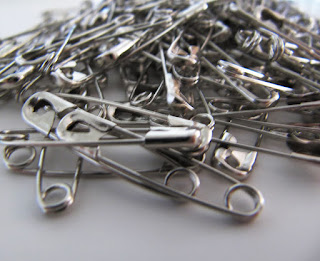I changed my profile pic, and I pinned a safety pin on my shirt, and I made it clear that I was doing it so that people who feel marginalized by the current political climate know they have an ally in me. It says, "I'm safe."
This is about me and the people who feel marginalized. It's not about Trump or the people who voted for him (or the people who voted for Hillary, for that matter). I don't think this pin will magically help anybody or supernaturally defuse conflict. I'm just saying, "I get why you're worried, and I stand with you."
It's about extending peace - shalom - to those who feel their nation has declared war on them - Hispanics, LGBT, Muslims, women, other racial minorities, immigrants in general - and saying it is my intent to be an agent of peace in this season of tension. I don't know what that looks like exactly, but I'm willing to try and figure it out.
 And for some weird reason, that really ticks some people off. It's caused a number of people to say really ugly things about me, to dismiss me as an intellectual lightweight, and to accuse me of being a pawn of the media.
And for some weird reason, that really ticks some people off. It's caused a number of people to say really ugly things about me, to dismiss me as an intellectual lightweight, and to accuse me of being a pawn of the media.
I even had to unfriend a Facebook friend. I NEVER do that! But his reaction was so ugly it was making me lose my own peace. I don't understand why he cares that I care.
So, I'm trying to figure out what we can learn from this.
Apparently it's true that being a peacemaker is counter-cultural.
When Jesus listed the eight qualities that would characterize the citizens of his upside-down kingdom, he included "peacemaker," because he knew it doesn't come naturally. Peace is a hallmark of the Way of Jesus, and it's the whole point of the gospel. Whatever you think it's about - staying holy, staying out of hell, staying on God's good side - whatever you think it's about, it's really about peace. It's about restoring shalom to God's good creation.
And until it's all restored - until Jesus returns - as long as we're here to represent him - it's all about hospitality - about extending grace and peace to the neighbor, the refugee, the immigrant, the outsider, the Samaritan.
And in Matthew 5:9, we learn that, in Jesus' kingdom, the peacemaker is already blessed because she is a "child of God." She reflects her maker.
So, when we look around today, we see shalom is fractured. Peace is overturned. People are heartsick and afraid. And, as Jesus followers, we shouldn't be worried about whether we have the best arguments, or whether we voted for the best set of policies. That season is OVER.
As Jesus followers, we need to be the ones with the glue and the bandages, picking up the pieces and putting things back together and bandaging peoples' wounds and reassuring the broken - even if it makes us look like intellectual lightweights or pawns of the media.
We need to make peace. But making peace is counter-cultural. So we shouldn't be surprised when trying to make peace actually causes strife. Really, it just proves my point.
Not sure what I'm going to do about the arguably harmless safety pin on my lapel, but I know that, every day, I'll be praying for our broken, confused, angry, conflict-obsessed nation. And safety pin or not, I will do whatever I can to make peace in this uncertain season.
And, yes, maybe I'll just start with a safety pin. At least it's a start.

